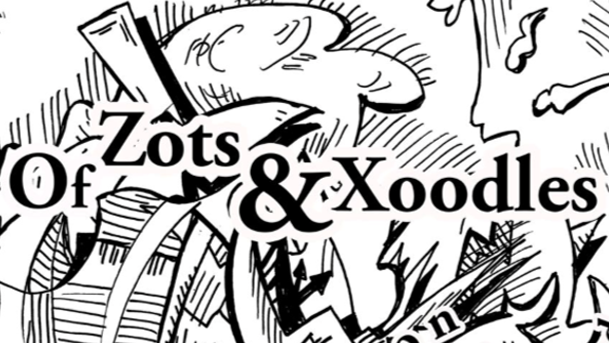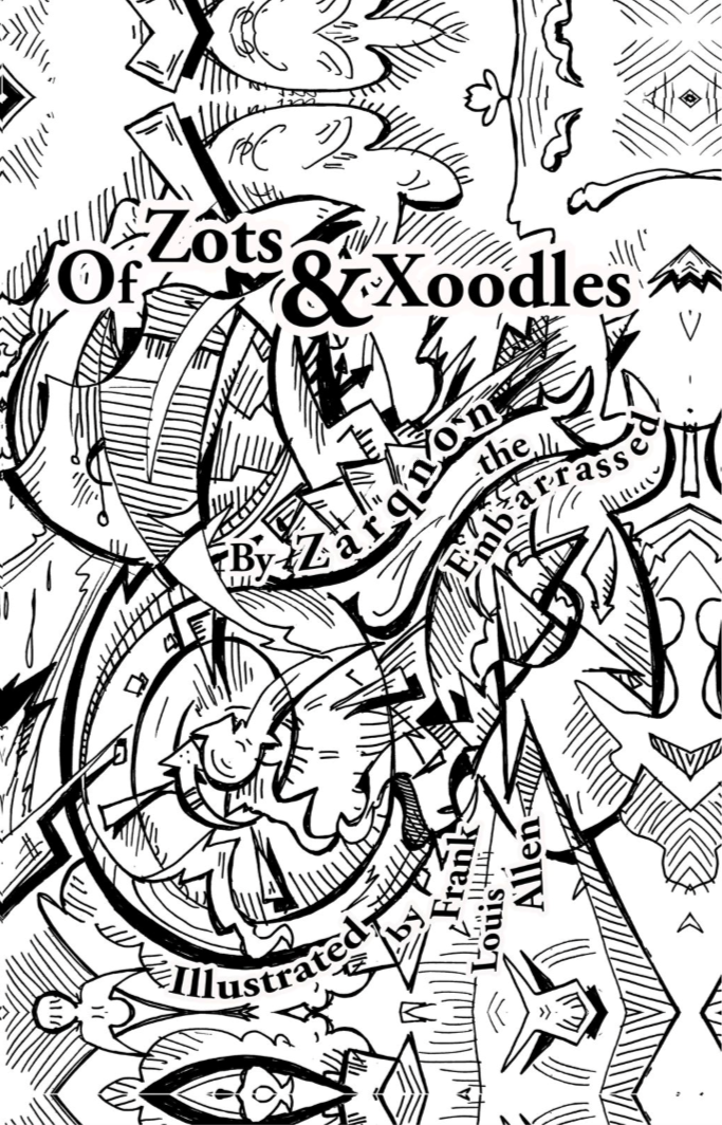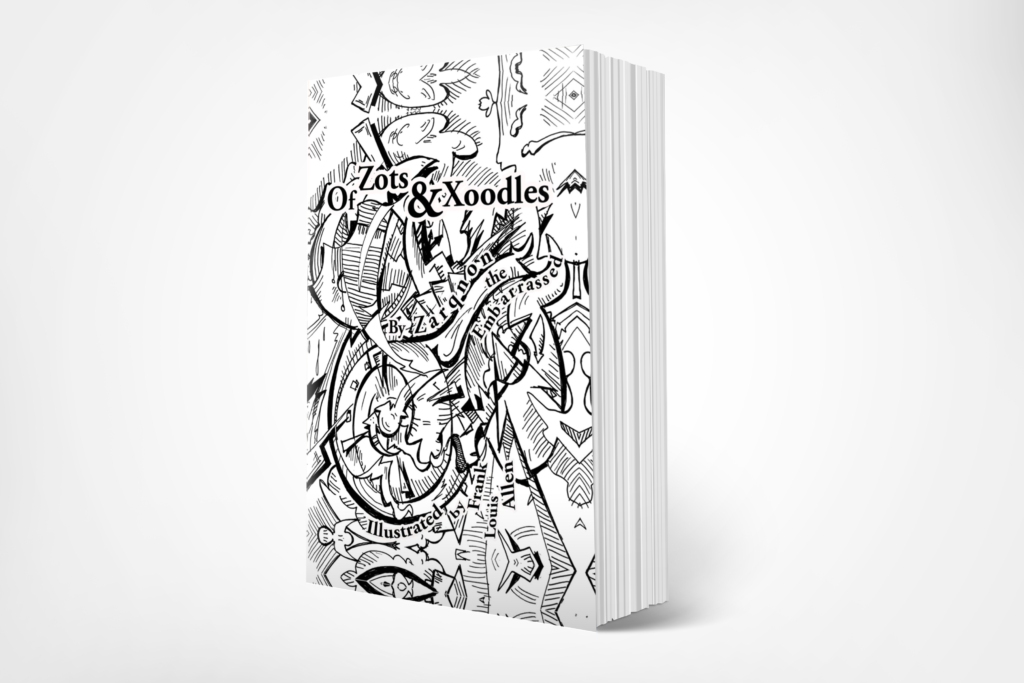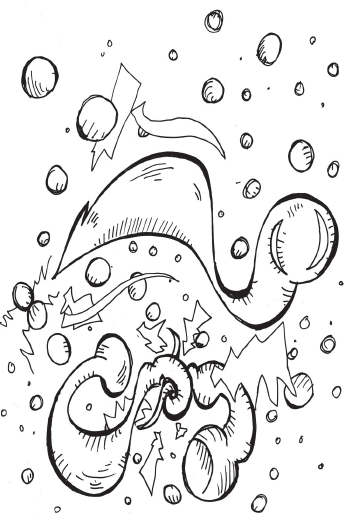Welcome everyone to our interview with the curiously-named Zarqnon the Embarrassed. He is the author of the newly released Of Zots and Xoodles: Theodil Creates a Universe, an allegorical look at the creation of our universe. Grab a seat and hold on tight. This is bound to be an interesting conversation.
Tellest: First off: thank you for joining us, Zarqnon. Considering all the things you muse and all the things you do, I definitely appreciate your time. You’re definitely not our typical author, so I’ll try and frame things a little differently than we do with some of our other interviews.
I guess the question scratching my brain is this: what made you decide to write Of Zots and Xoodles?
Zarqnon the Embarrassed: Multiple things, really. I am autistic, and my brain absorbs everything. On top of that, like many individuals on the spectrum, I see things on a matrix—verses linearly. For example: if a non-autistic person is talking about math, they will typically think along the line of math and math topics. If someone like me is talking about math, I can be thinking and including in the conversation everything from Metallica, Kierkegaard, Monchichis, HR PufnStuf, the shape of different types of spoons, etc. There are no parameters separating concepts.
One of the topics I have been tinkering with recently has been: what came before the universe, and what the parameters of it would have to be. Recently, there is a new Vice Provost for where I work (and my boss, one level removed) who is a physics professor, so I would beat back and forth many of the ideas I had – entropy, light, gravity, other variables and constants.
My next dilemma was how to construct my theories into a book. Writing a technical book is hard for anyone, and being very non-linear in my personal paradigm makes it nearly implausible. So I thought about how I would like it. I just learned I was autistic a few years ago, and it has encouraged me to allow my brain to “organize” and “develop” things that I know would be unique.
I know that a lot of individuals have eschewed “intelligent design”, but, being a theist, I have no problem with including “someone intelligent behind the construct”. I like William Paley’s notion of natural theism, where God functions through the laws that govern the universe (verses the wham bam pow) to construct things. If God created it, I have a hard time thinking that an intellectual being took the “cheap and easy” way to do it. This “functions through the laws” allows the inclusion of logic and intentional process and progress, but not simply the “how would I do it”—if it looked too simply/oakum’s, then there is something amiss—we cauterize our own logic system with our personal bias and our needs to simplify and make process and data fit into our personal flow. But if we layer on very basic notions of science over the quantum realm, we can produce some really interesting parameters (like gravity occurring because of an imbalance of matter and the whole osmosis/wanting to press through a membrane to produce an equilibrium).
So I thought “what if I have someone in front of a committee (I left my PhD as ABD due to my inability to come to an agreement with my committee) build a universe step by step?” Then I could embrace all the philosophical, love for absurdism (Dr Seuss to HHGTTG), Sci-Fi, abstractness, and other wonkiness that makes up my thought process into it.
T: How difficult was it to keep this book in a form that made sense to you? It seems like at any moment, it could have unraveled and made your head explode!
ZtE: As I mentioned, my head functions on a matrix: there are multiple amalgamated layers of thought typically going on at any given time, and yet those layers are not autonomous—the concepts from the layers are constantly bleeding into others.
T: Does this end up causing you to have to take an incredible amount of notes, or is it all locked in your brain, ready to tap into whenever you want it?
ZtE: I have some scribbles. But most of it is in my head. A lot of what I am writing is me trying to explain what I see inside my head: I SEE all this in my head – as mentioned previously, a big matrix with data swarming all around. The issue I have is describing it.
T: Well, I think you’ve done a great job with Zots and Xoodles. It’s definitely tricky material to write about, but it’s presented in a way that is very accessible. Did you kind of audition it to people who you thought might have had a hard time with it?
ZtE: Not really… unfortunately trying to “cater to or ask advice from people who might have a hard time with it” can cause discouragement and can cause one to “over simplify”. I just wanted to write, and design it in such a way that someone without any technical knowledge could still pull something out of it, even if it was simply enjoying the absurdity.
T: You’ve got plenty of other interests and backgrounds to speak of—a world of lives lived, it seems. What makes Zarqnon the Embarrassed tick?
ZtE: I want to do a good job. It sounds simple, but I want to use what I have been given, and I want to use it well. We all have things that make us unique, and to not embrace them and use them is disrespecting our creator and robbing from those who may find peace and solace through our individual distinctions.
T: Alright, back to Zots and Xoodles. You’ve got characters that exist within the abstract world you created here, including Theodil and the inquisitive child. What do they represent, in your mind?
ZtE: The “cut-rate” answer would simply say it’s “God” and “Jesus” or some prophet/philosopher. But really, I wanted to anthropomorphize the process. There was no direct religious intent. That way I could embrace the logic and design. Simply saying “the strings/pre-universal fibers hit, and then they unraveled and left fragments that melded together to form…” just sounded too “academic”. Yuck. Theodil embraces the logic and process, the child embraces the scientific phenomenon and philosophical inquiry, the “what and why did this happen”. The committee, as well, are part of the inquiry, as well as our nature to want conventional explanations. The child and the committee embrace the multi-faceted pond where Cynic, Skeptic, and honest exploration of the data fuse and repel.
One little facet I don’t think is as obvious, but tickles my philosophical view is the announcer coming along after elaborate stints and “summing up”/simplifying everything done. For example: the processes Theodil creates manifest multiple time frames, each with their own parameters. After all said and done, the announcer just says “Theodil has created Time.” I find it amusing how people simply view a religious text where it says “God took dust and created humans”, and completely disregard the fact that the “creating” includes designing a complex being with Golgi apparatus, mitochondria, gazillion miles of capillaries, and has symbiotic relationships with billions of microbes. As I mentioned, I think there is process to everything, and the “wham bam pow” is a cheap and intellectually dishonest way to embrace something so amazingly delicate and intricate.
T: It takes a smarter man than me to put all these thoughts together. Have you received your fair share of praise by bringing this abstract story to life?
ZtE: I have gotten a little bit of feedback. I will say I am a horrible interpreter of feedback. A “curse” of being on the spectrum is a reduced (or in my case, complete absence) of the ability to interpret peoples’ responses. Funny story: when we first met, my wife hated me for years, and everyone knew it but me… I had no clue -completely oblivious. Good thing, because she is the best thing that has ever happened to me. She is very structured, and it has enabled me to function far above what I would have ever been able to do without her. I do know that the book does confuse some people, and people who are not used to absurdism or abstract language (Lewis Carroll, Dr Seuss, etc) are thrown by it. And I know that people who are expecting “proper”, “professional” or “technical” language may find it annoying, because I have lost the motivation for fitting my writing into any given models for acceptable writ.
T: I think the advent of the Amazon Kindle marketplace definitely changes that up a little bit though. It opens up the opportunity to write stories like this that wouldn’t be considered mainstream. If you couldn’t have released it as a book, how do you think you would have presented it?
ZtE: One man play doing interpretive dancing…with lasers…and a smoke machine. Just kidding. I don’t know what I would have done. I probably would have done some kind of home grown book and just handed it out or made a home grown website and given it out. Right now, I am trying to convince some schools to take a look at it as a text book type thing, because it has literary, science, philosophical, and artistic elements to it.
T: You learned when you were close to 40 years old that you were on the autism spectrum. How did this help you understand the person that you were, and what questions did it leave you wondering about yourself?
ZtE: I learned that I was on the spectrum, like many adults who discover they are on the spectrum, because a child or someone related is diagnosed. And through the uncovering process of what denoted that individual as “on the spectrum”, lights go off: it’s like “hey, that explains a WHOLE lot”. People like me KNOW we are different (it has been referred to as “Wrong Planet Syndrome”)—we grow up knowing it, that we don’t fit in, that the world around us does not make sense at all, that what other people are enjoying is just plain foreign. I, like many other undiagnosed adults on the spectrum, typically attributed it to something that may have happened in the past: I have hydrocephalus, so I just attributed it to post traumatic stress caused by MANY childhood head surgeries. People like Susan Boyle attributed it to being dropped as a child. But the person who was diagnosed and was related to me did not have those surgeries, and they behaved exactly like me.
In short, to me, it meant I wasn’t broken: there is a process in the design. It opened up the door for me to understand my personal thought paradigm, which the filters work differently, not “brokenly”
People like me typically don’t get diagnosed: 1) it is difficult to get a diagnosis for adults, because most of us don’t always remember the childhood behaviors that are typically used for a diagnosis, 2) we have developed coping mechanisms that mask most of the behaviors, and 3) most importantly, the only reason people are typically is because there is an issue that a proper diagnosis could aid. An official diagnosis is of no use to me.
T: The illustrations are another interesting point to bring up. The artist made everything seem very sci-fi Dr. Seuss, which seemed like it was the goal. How did you manage to make that happen, and how did you figure out that fit in the story you were telling?
ZtE: If you study Frank Louis Allen (http://franklouisallen.tumblr.com/) you will see that he typically draws exactly what you see—sci-fi Dr. Seuss Salvador Dali type stuff. That is why I asked him to illustrate it: his art expressed exactly how I saw things. Other illustrators I experimented with were very “linear” in their design—they would simply draw a person in front of a committee, etc. Frank’s processor works a lot like mine: open and unrestrained by normal paradigms.
T: And this is because Allen is also on the autism spectrum, isn’t he? Did you two end up meeting because of the book, or because you were studying more about autism, or was it just something that synced up at the right time?
ZtE: We met up on facebook somehow. It could have either been a spectrum oriented group or an artist type thing…I don’t really remember.
T: You do a bit more than just write. You’re also into music, and you have a decent selection of experimental and abstract songs. How long have you been toying around with that?
ZtE: I’ve been writing music for decades. I started out in my youth writing more lounge/bar/folk on piano, being that I listened to people like Elton John, Billy Joel and Keith Green. In high school, I started playing in bands – the early ones like rush and pink Floyd, and the later ones started sounding more Metallica/ Queensryche/Iron Maiden. After leaving that, I started experimenting with electronic music. I wrote stuff along the lines of Depeche mode, moving heavier and with random notes. Then, one day, while arranging some hymns my wife had recorded, I thought “why don’t I make these into completely chaotic arrangements”, and I started cutting, pasting, distorting, etc. the album is called “Worm as I” and is by the pseudonym “Phloide”. From there, it just went downhill. I did some classical oriented stuff, including strange variations of Canon in D and writing my own fugues, which I called BWV 0, Mistakes on a Theme. I was calling myself Bach Spurious, but some of the outlets (Spotify, iTunes) got mad at me for it. I write what comes to me: easy listening to gothic acapella to chaos. No country or rap. And I am very bad a pop… and my problem with techno is that I get very bored with it, so I start ripping it apart and distorting it and stuff…
T: If there was a specific album or song (or two) that you were really proud of, where would you point readers to?
ZtE: I have no idea where to even start on that one… none. I would point to my pseudonyms: Phloide (electronic music), Asperger Beeblebrox (gothy vocal experiments), Zarqnon the Embarrassed (chaos)…
T: You’ve also made mention that Of Zots and Xoodles is a charitable cause. All the proceeds that are earned from this book go to local schools to assist children who might need assistance. Is that right?
ZtE: Yes. I donate a lot of my hobby money to local schools, including paying off lunch debts and buying supplies for students. I won’t go into exactly what I do, because 90% of what I do, I do anonymously. I want to do a good job. That is what makes me tick 😊
I’d like to thank Zarqnon for joining us for this interview. It was eye-opening and very entertaining. Don’t forget, Of Zots and Xoodles: Theodil Creates a Universe is ready for you on Amazon. Pick it up and have a fantastic time with it!
Michael DeAngelo
Latest posts by Michael DeAngelo (see all)
- Sci-Fi Promo: Battlefield Earth: A Saga of the Year 3000 - April 18, 2024
- The Whispers – Chapter Ten - April 18, 2024
- Concept Art – Atalatha Arena - April 17, 2024



